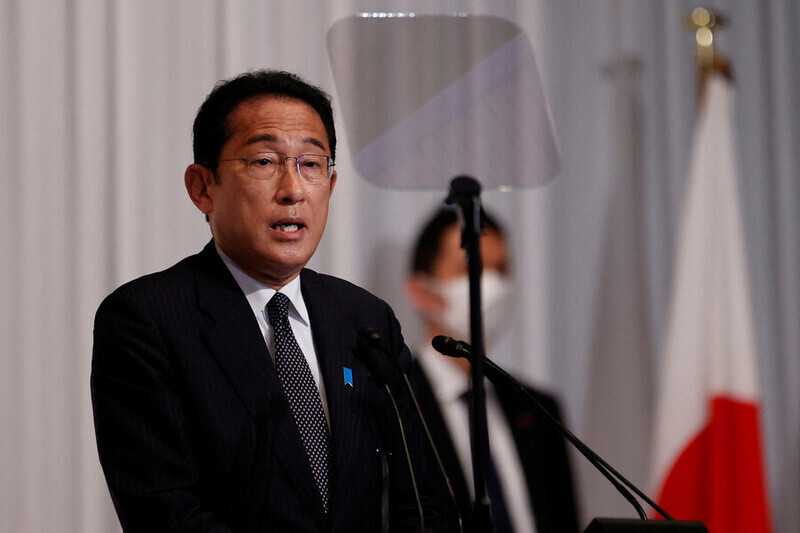hankyoreh
Links to other country sites 다른 나라 사이트 링크
Abe’s death poses hurdles for mending S. Korea-Japan ties, Japanese press reports

The death of former Japanese Prime Minister Shinzo Abe, who had been a lodestar for conservatives and the right wing within Japan’s Liberal Democratic Party (LDP), has made it even harder for Prime Minister Fumio Kishida to reach a compromise with South Korea over historical issues, according to analysis in the Japanese press.
South Korean Foreign Minister Park Jin and Japanese Foreign Minister Yoshimasa Hayashi agreed during their first meeting since Park took office to quickly address the issue of compensating Koreans drafted for forced labor during the Japanese colonial period, but putting a solution into action appears likely to remain difficult.
“The slaying of former Prime Minister Shinzo Abe while campaigning two days before election day threw up another hurdle in the mutual quest to put bilateral ties back on a strong neighborly footing,” the Asahi Shimbun, a Japanese newspaper, opined about Park and Hayashi’s meeting in its July 19 edition.
“Abe had shepherded the party’s conservatives in support of the Kishida administration. Depending on [Kishida’s] actions going forward, the conservative wing could turn their backs on him in an instant,” said a veteran lawmaker in the LDP’s conservative wing.
Given the massive influence that Abe had wielded inside the party, his departure will force Kishida to court the conservative wing as a whole.
“There were concerns that if the Kishida administration was seen as taking a much more conciliatory stance toward Seoul, conservative elements within the ruling Liberal Democratic Party could begin openly voicing opposition to such moves,” the Asahi Shimbun reported.
The LDP’s conservative wing strongly feels that Japan shouldn’t budge until Korea arranges its own solution. That’s reportedly why Park’s courtesy call on Kishida was only arranged at the last minute.
“There was some hesitancy in the prime minister’s office about whether Kishida should meet with Park. That resulted in the announcement of Park’s visit to Japan being delayed until the evening of July 15, three days before [the foreign ministers’] meeting,” a Japanese government official told the Asahi Shimbun.
Park met with Kishida on Tuesday afternoon.
Park’s visit to Japan had been strongly requested by the South Korean government, under President Yoon Suk-yeol, sources say.
“The Koreans have wanted to sustain the mood for improving relations [with Japan] that developed when power changed hands,” said a senior official in the Japanese Ministry of Foreign Affairs.
“The Japanese government’s agreement to hold a foreign ministers’ meeting also reflects its desire to resolve the conscript labor issue early in Yoon’s presidency, when he still has the political capital to follow through on his eagerness to improve relations with Japan,” said the Yomiuri Shimbun, another Japanese newspaper.
“But considering that Yoon’s approval rating is already falling, it’s unclear whether it will make a difficult political decision on the conscript labor issue,” the newspaper added.
The Yoon administration holds that cooperation from Japan is needed to resolve the issue of compensation for victims of forced labor. The issue may not be solvable unless Japanese corporate defendants in the litigation, including Mitsubishi Heavy Industries and Nippon Steel, commit to, at least to some extent, an apology and compensation.
“It would be difficult for the Korean government by itself to come up with a solution that would satisfy both the plaintiffs and the public. Liquidation [of Japanese companies’ assets] cannot be stopped without some cooperation from the Japanese,” a close associate of Yoon’s told the Mainichi, a Japanese daily.
By Kim So-youn, Tokyo correspondent
Please direct questions or comments to [english@hani.co.kr]

Editorial・opinion
![[Editorial] Yoon must halt procurement of SM-3 interceptor missiles [Editorial] Yoon must halt procurement of SM-3 interceptor missiles](https://flexible.img.hani.co.kr/flexible/normal/500/300/imgdb/child/2024/0501/17145495551605_1717145495195344.jpg) [Editorial] Yoon must halt procurement of SM-3 interceptor missiles
[Editorial] Yoon must halt procurement of SM-3 interceptor missiles![[Guest essay] Maybe Korea’s rapid population decline is an opportunity, not a crisis [Guest essay] Maybe Korea’s rapid population decline is an opportunity, not a crisis](https://flexible.img.hani.co.kr/flexible/normal/500/300/imgdb/original/2024/0430/9417144634983596.jpg) [Guest essay] Maybe Korea’s rapid population decline is an opportunity, not a crisis
[Guest essay] Maybe Korea’s rapid population decline is an opportunity, not a crisis- [Column] Can Yoon steer diplomacy with Russia, China back on track?
- [Column] Season 2 of special prosecutor probe may be coming to Korea soon
- [Column] Park Geun-hye déjà vu in Yoon Suk-yeol
- [Editorial] New weight of N. Korea’s nuclear threats makes dialogue all the more urgent
- [Guest essay] The real reason Korea’s new right wants to dub Rhee a founding father
- [Column] ‘Choson’: Is it time we start referring to N. Korea in its own terms?
- [Editorial] Japan’s rewriting of history with Korea has gone too far
- [Column] The president’s questionable capacity for dialogue
Most viewed articles
- 1Months and months of overdue wages are pushing migrant workers in Korea into debt
- 2At heart of West’s handwringing over Chinese ‘overcapacity,’ a battle to lead key future industries
- 3Seoul getting its first-ever vertical farm
- 4[Column] For K-pop idols, is all love forbidden love?
- 5Trump asks why US would defend Korea, hints at hiking Seoul’s defense cost burden
- 6[Editorial] When the choice is kids or career, Korea will never overcome birth rate woes
- 7[Editorial] Yoon must halt procurement of SM-3 interceptor missiles
- 8[Guest essay] Maybe Korea’s rapid population decline is an opportunity, not a crisis
- 9Under conservative chief, Korea’s TRC brands teenage wartime massacre victims as traitors
- 10[Editorial] 10 years on, lessons of Sewol tragedy must never be forgotten